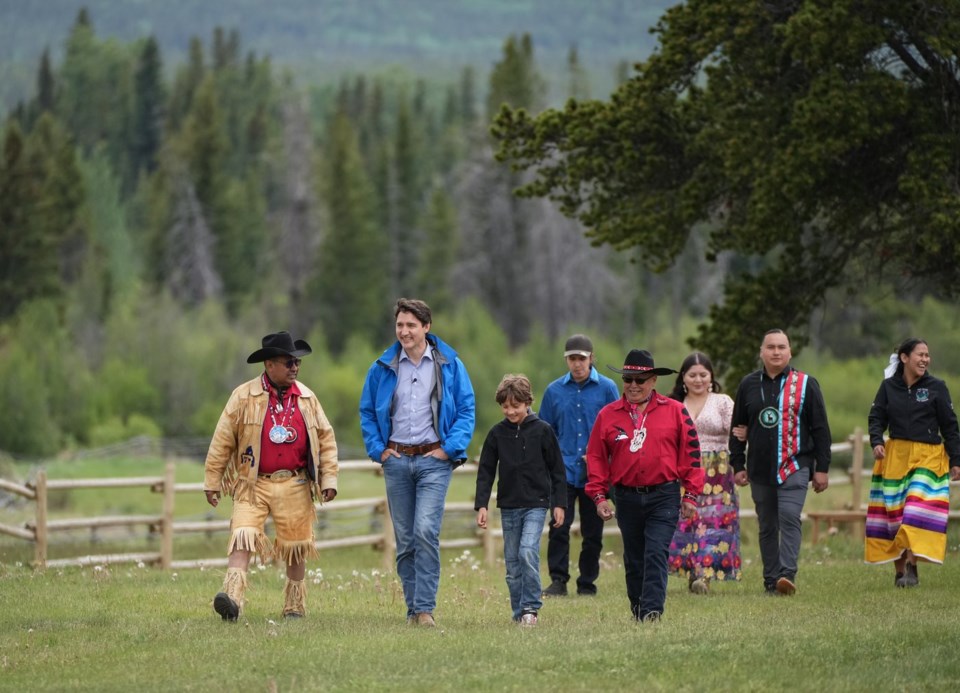NEMAIAH VALLEY, B.C. — Chief Joe Alphonse of the Tsilhqot’in First Nation says the 2014 court ruling that resulted in the first declaration of Aboriginal title in Canadian history triggered a decade of "huge" shifts.
Alphonse said on Wednesday's 10th anniversary of the Supreme Court of Canada decision that recognized the First Nation as the titleholder within their traditional territory that there had been a transformation in policy toward Indigenous people that "cut deeper than I ever imagined that one single case could."
Speaking in Tsilhqot’in territory in the remote Nemaiah Valley in British Columbia's Interior, Alphonse said the "pendulum's always swinging in politics," looking back on the last decade while remembering the adversarial relationship with the Harper-era Conservatives.
Alphonse said he feared a change in the federal government would mean going back to a situation where the First Nation had to fight resource extraction and other threats to their land.
"We're going to be at odds with them all over again and there will be court battle after court battle," he said. "If they want to go down that road, we're happy to engage in a fight, but we hope we don't have to."
Prime Minister Justin Trudeau was joined by provincial officials, federal Minister of Crown-Indigenous Relations Gary Anandasangaree and Indigenous leaders, along with members of the First Nation in the Nemaiah Valley to celebrate the anniversary.
Trudeau paid tribute to what he called a "pivotal moment" for the country.
"It took a lot of work by many, many extraordinary and dedicated leaders to get there, but you never gave up. This is what we're celebrating today, your strength and your resilience," Trudeau told hundreds of people gathered for the event.
In a statement, he said the "anniversary emphasizes our ongoing commitment to reconciliation and partnership with all Indigenous Peoples."
B.C. Minister of Indigenous Relations Murray Rankin called it a powerful and moving experience to be in Tsilhqot’in territory on the anniversary of a ruling that changed Canadian history.
The Tsilhqot'in, representing six First Nation communities with a common culture and history, is the only Indigenous group to win recognition of its Aboriginal title to a specific area of land through Canada's highest court.
Reflecting on the decision, Rankin said he believed reconciliation was rarely, if ever, achieved in a courtroom, so the best route to determine Aboriginal title was through negotiation.
"The fact that 10 years ago, the Supreme Court of Canada declared that there's actually aboriginal title on the ground, right here in the Nemaiah Valley, it's really, really powerful and poignant to be here," Rankin said.
Anandasangaree agreed, calling the Tsilhqot’in court decision a "milestone" that marked an "important step toward decolonization."
He said the ruling meant that "title was rightfully restored and we're here to mark that occasion."
"We're celebrating a path forward for Canada. While it's very significant for the Tsilhqot'in people, it's still very important to Canada as well because for far too long, we have been reaffirming colonial practices and this is one of the very important steps toward the decolonization."
He said land was "a critical part of reconciliation."
Trudeau and his youngest son, Hadrien, met with First Nations chiefs, and spoke with elders and witnesses involved in the years-long court case.
During the visit, Peyal Laceese, a Tsilqhot'in knowledge keeper and songkeeper, presented Hadrien with a pair of buckskin gloves and moccasins, carrying on a long tradition and connection between their two families.
Laceese said his grandmother, Julia Gilpin, gave Pierre Trudeau a buckskin jacket many years ago, and his mother, Denise Gilpin, made Justin Trudeau a jacket as well.
"She presented him with that jacket, creating a tradition of multi- generational honouring of our families coming together," he said. "Not only trading physical objects, but trading that positivity and that warmth of heart … And so here we are in 2024 again hearing of the Trudeau family coming to visit the Tsilhqot'in territory, and so I felt obligated."
The prime minister travelled to the valley, about 350 kilometres north of Vancouver, just days after his party lost a pivotal Toronto-area byelection in a riding that had been held by the Liberals for more than three decades.
Trudeau said during an unrelated news conference on Tuesday that the outcome showed his government had more work to do to deliver results Canadians can see, but he didn’t answer questions. He wouldn’t take questions on Wednesday either.
In 2014, the Supreme Court of Canada found the Tsilhqot'in successfully proved title by showing regular and exclusive use of the claim area, and that B.C. had breached its duty to consult them. It recognized Aboriginal title in five per cent of what the First Nation considered its traditional territory, while protecting rights like fishing, harvesting and trapping in the broader claim area.
The decision said the Tsilhqot'in have lived and roamed for centuries in a remote valley bounded by rivers and mountains in central B.C.
Unlike other parts of Canada, much of the land in British Columbia has never been ceded through treaties and the court said the Tsilhqot'in were among hundreds of Indigenous groups in the province with unresolved land claims.
B.C. Premier David Eby said in a statement that a decade after the ruling, the province was continuing to work with First Nation elders and leaders to find a path forward "based on reconciliation, respect and recognition of rights."
"B.C. is committed to a progressive and deepening government-to-government relationship with the Tsilhqot’in Nation because we see time and time again that a rising tide lifts all boats,” he said.
For Alphonse, the significance of the Supreme Court's decision a decade ago went beyond the borders of B.C. and Canada.
"It's a big story. This is not just Tsilhqot'in, not just Canada. This is international," he said. "The Tsilhqot'in case is giving hope to Indigenous people all around the world."
This report by The Canadian Press was first published June 26, 2024.
Darryl Greer, The Canadian Press




